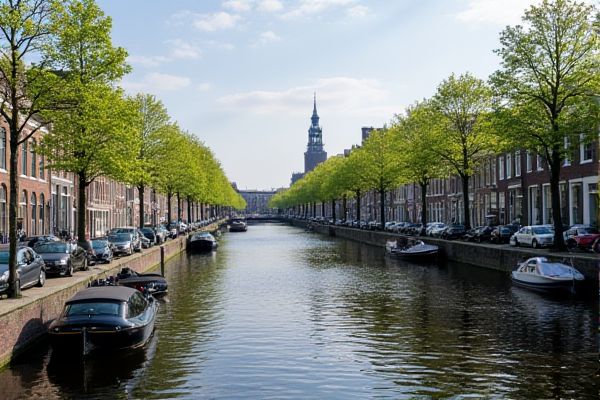
What to know as new resident in Netherlands: Dutch language basics and phrases. Register with the local municipality. Understanding the healthcare system. Opening a Dutch bank account. Dutch work culture and practices. Public transportation options. Bicycle rules and etiquette. Rental housing market overview. Tax system and requirements. Local emergency contact numbers.
Dutch language basics and phrases.
As a new resident in the Netherlands, it is essential to learn basic Dutch words and phrases such as greetings like "Hallo" (Hello), "Goedemorgen" (Good Morning), and "Goedenavond" (Good Evening). You should also know phrases like "Alsjeblieft" (Please), "Dankjewel" (Thank You), and how to ask for common items like a menu or the bill, which will help you navigate everyday situations effectively. For more insights, visit the Basic Words and Phrases for a comprehensive guide that will ease your transition into daily Dutch interactions and enhance your travel experiences within the country.
Register with the local municipality.
To register with the local municipality in the Netherlands, you must do so in person if you plan to stay longer than 4 months, bringing proof of identity, proof of address, and other relevant documents like marriage and birth certificates. Your registration will be finalized once the municipality confirms your lawful residence, and you will receive a citizen service number (BSN) necessary for various administrative purposes. For more detailed guidance on this process, visit the Euraxess Netherlands Website, which provides comprehensive support for researchers navigating entry conditions and visas.
Understanding the healthcare system.
In the Netherlands, the Healthcare System is universal and mandatory, requiring all residents to obtain basic health insurance from a Dutch provider within four months of arrival. The system is managed by private insurers but regulated by the government, ensuring comprehensive coverage for essential medical services, including GP visits, hospital care, and specialist treatments, with no refusal based on pre-existing conditions. For more details on the intricacies of this system, you can visit the Healthcare System in the Netherlands.
Opening a Dutch bank account.
To open a Dutch bank account, foreigners can choose banks like Rabobank, ABN AMRO, or ING for residents, and Bunq, N26, or Wise for non-residents. You will need documents such as a passport, proof of address, and sometimes a BSN (Burgerservicenummer) or proof of income, with the option to apply online or in person, depending on the bank's policies. For further detailed information, you can visit the Bank Account Netherlands guide to understand all necessary requirements and processes involved.
Dutch work culture and practices.
The Dutch work culture emphasizes a flat hierarchy, equality, and teamwork, with a strong focus on direct communication, honesty, and professionalism. It prioritizes work-life balance, punctuality, and efficiency, and encourages open feedback and collaboration to foster a positive and productive work environment. For more insights, visit the NNRoad blog to explore the nuances of this unique work culture.
Public transportation options.
In the Netherlands, public transportation is highly efficient and sustainable, offering trains, buses, trams, metros, and ferries. You can use contactless payments or the OV-chipkaart to travel, with modern and comfortable facilities, including USB chargers on trains and well-coordinated bus and tram schedules. For more detailed information on how to navigate public transport, you can visit the official website for Public Transport In The Netherlands, which provides comprehensive guidance. This system ensures a seamless and convenient travel experience across the country.
Bicycle rules and etiquette.
As a new resident in the Netherlands, it is crucial to know that cyclists must keep to the right side of the road, use compulsory cycle paths, avoid cycling on pavements, indicate turns with hand signals, stop at red traffic lights (except for right turns at specific signs), and have a functional bell on their bike. Additionally, Cycling Under the Influence, texting while cycling, and parking in undesignated areas are all prohibited and can result in fines.
Rental housing market overview.
As a new resident in the Netherlands, you should be aware that the rental housing market is experiencing significant changes, including a decrease in available rental properties due to landlords selling off homes. Particularly, cheaper ones are being sold, driven by the Affordable Rent Act and stricter regulations. This trend is leading to higher housing prices and a reduced rental supply. For more detailed information on this topic, you can visit the article on the IamExpat website.
Tax system and requirements.
As a new resident in the Netherlands, you need to understand that the tax system categorizes individuals as residents or non-residents, with residents taxed on worldwide income and non-residents only on Dutch-sourced income. Residents must file an annual income tax return (Inkomstenbelasting) by May 1, reporting all global income, and the tax system uses a progressive rate system divided into three boxes (Box 1 for employment and home ownership, Box 2 for substantial interest in a company, and Box 3 for savings and investments). For detailed guidance on this matter, consider consulting the resources available on Tax Preparation In Netherlands to ensure compliance and optimization of your tax filings.
Local emergency contact numbers.
In the Netherlands, it's crucial to know the appropriate numbers to dial in case of emergencies. For immediate assistance involving police, fire, or ambulance services, dialing 112 is essential. However, for non-urgent matters, residents should contact the police at 0900 8844. There are also specific numbers dedicated to other important services, including reporting crimes anonymously at 0800 7000, addressing animal emergencies at 0900 0245, and dealing with utility emergencies at 0800 9009. To explore more about these essential contacts, visit the comprehensive guide on Dutch Review.
